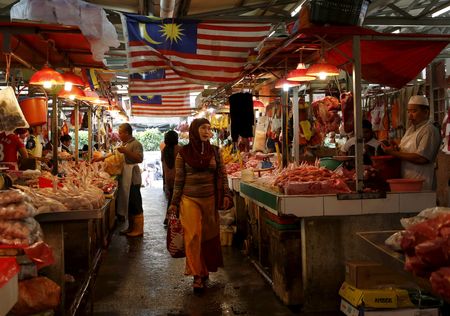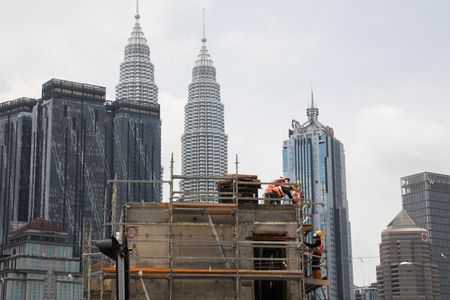By Rozanna Latiff and Mei Mei Chu
KUALA LUMPUR (Reuters) – Malaysia’s economic growth picked up pace in the first quarter and was likely to accelerate further this year amid sustained demand and the reopening of international borders, the central bank said on Friday.
Gross domestic product rose 5% in the January-March period, faster than the 4% expansion forecast by a Reuters poll and up from 3.6% growth in the previous quarter.
Bank Negara Malaysia (BNM) said it had factored in global supply chain disruptions, the Russia-Ukraine war and strict lockdowns in China to stem the COVID-19 outbreak in its growth projections for 2022.
“Although the downside risks have risen on the global front, we are confident of our growth trajectory and we do not see a risk of any recession in Malaysia,” she told a news conference.
The central bank said in presentation slides that growth would expand further. “In 2022, growth will be supported by continued expansion in global and domestic demand.”
BNM kept its 2022 economic growth forecast at between 5.3%-6.3%, which it had downgraded in March.
Expansion was mainly driven by the services and manufacturing sectors, particularly continuing demand for semiconductors and consumer products such as motor vehicles, BNM said.
Malaysia – which has seen some of the worst COVID-19 outbreaks in the region – lifted most of its coronavirus measures this month, as infection rates slowed amid a ramped up vaccination programme.
On Wednesday, the central bank unexpectedly raised its benchmark interest rate to 2.00% from an historic low of 1.75%, citing a firmer domestic growth path as well as inflationary pressures stemming from the Ukraine conflict and global supply chain disruptions.
“If positive growth trajectory continues and barring any unexpected shocks, it would be appropriate for the MPC (Monetary Policy Committee) to further reduce the degree of monetary accommodation,” she said.
INFLATION AND GST
Headline inflation was projected to average between 2.2% – 3.2% this year, unchanged from BNM’s earlier estimate.
Deputy Governor Marzunisham Omar said that while there are price pressures especially on food, inflation in Malaysia remains moderate compared to other countries.
However, more long-term solutions were needed to rein in inflation due to the rising cost of government subsidies, he added.
Marzunisham said the government was looking to broaden the country’s tax base to increase revenue, including the reintroduction of the goods and services tax (GST).
“(The central bank is) supportive of GST and of course, we have to think about the timing of the reintroduction which will be taken into account by the government,” he said.
Capital Economics economist Alex Holmes said Malaysia’s economic recovery was likely to continue throughout the rest of 2022, as an outbreak of the Omicron COVID-19 variant in the first quarter has subsided.
“With virus cases lower and domestic restrictions having eased further, consumer spending likely has further to rebound this quarter,” he said in a note.
(Editing by Jacqueline Wong)












